The Florida Supreme Court has decided Whiley v. Scott. That’s Gov. Rick Scott, and he lost, so the regulatory freeze, one of his first acts as Governor — taken less than an hour after taking office — is toast.
In exercising our discretion to resolve this matter, we grant relief and specifically hold that the Governor impermissibly suspended agency rulemaking to the extent that Executive Orders 11-01 and 11-72 include a requirement that the Office of Fiscal Accountability and Regulatory Reform (OFARR) must first permit an agency to engage in the rulemaking which has been delegated by the Florida Legislature. 1 Absent an amendment to the Administrative Procedure Act itself or other delegation of such authority to the Governor‘s Office by the Florida Legislature, the Governor has overstepped his constitutional authority and violated the separation of powers.
and
To the extent that Executive Order 11-01—and superseding Executive Order 11-72 (issued subsequent to the date Whiley filed her petition)—suspend the rulemaking process established by the Florida Legislature under Chapter 120, the Florida Administrative Procedure Act (APA), we conclude that the Governor exceeded his constitutional authority.
The majority opinion (a per curiam for five of the Justices) has some scathing footnotes about the dissent by Justice Polston.
The Court decided the case on a state writ of quo warrento presented to it as an original matter. (You don’t see that every day.) I think it’s safe to say that if this had been a Presidential action under federal law, the Supreme Court would not have taken original jurisdiction, and the lower courts would most likely have rejected this particular challenge for lack of standing even if the action were in fact heinously illegal. But Florida law is notoriously different, both in its separation of powers and even more so in its administrative law. Indeed Florida’s APA is one of the most different in the nation from the federal system, so much so that although I know my way around the federal APA pretty well, I don’t claim any expertise about state administrative matters. This case well illustrates some of those differences in action.
There is an element of judicial statecraft (some might say activism) here, in that the Court essentially admits that its decision to decide the case — at least as an original filing direct to the Supreme Court — was discretionary. The reasons it gives for choosing to act are these:
As a general rule, unless there is a compelling reason for invoking the original jurisdiction of a higher court, a quo warranto proceeding should be commenced in circuit court. See Vance v. Wellman, 222 So. 2d 449, 449 (Fla. 2d DCA 1969). This Court may choose to consider extraordinary writ petitions “where the functions of government would be adversely affected absent an immediate determination by this Court.” Chiles, 714 So. 2d at 457; see, e.g., Allen v. Butterworth, 756 So. 2d 52, 55 (Fla. 2000) (entertaining jurisdiction on a petition for writ of mandamus where failure to resolve the issue would result in a large number of postconviction death case proceedings being in “limbo,” and where the responsibilities of a large number of state-employed attorneys would be affected); Moreau v. Lewis, 648 So. 2d 124, 125-26 n.4 (Fla. 1995) (entertaining jurisdiction on a mandamus petition which sought to invalidate a portion of a General Appropriations Act that required Medicaid recipients to make a $1 copayment for pharmacy services, finding that “an immediate determination is necessary to protect governmental functions,” and noting that there was no relevant factual dispute which would require “extensive fact-finding”). Moreover, in Harvard v. Singletary, 733 So. 2d 1020, 1021-22 (Fla. 1999), this Court explained that it would “decline jurisdiction and transfer or dismiss writ petitions which . . . raise substantial issues of fact or present individualized issues that do not require immediate resolution by this Court, or are not the type of case in which an opinion from this Court would provide important guiding principles for the other courts of this State.” (Emphasis in original).
We find that the present case raises a serious constitutional question relating to the authority of the Governor and the Legislature respectively in rulemaking proceedings. The issue of whether the Governor has the power to suspend agency rulemaking directly and substantially affects the fundamental functions of state government. We also note that a decision from this Court on such an issue would provide important guiding principles to other state courts, and that there do not appear to be any substantial disputes of material fact. Accordingly, we exercise our discretionary jurisdiction and entertain the petition for writ of quo warranto.
Discretion to take cases exists to be used — at least sometimes. I think what I quoted above is a reasonable justification of why the Court exercised its discretion, particularly when one considers that this case raised a claim of an on-going violation, not just a past one. I suspect nonetheless that this explanation will not persuade everyone. Indeed, no doubt someone somewhere will scream this is a political outcome — and it is definitely an embarrassing loss for the Governor — but I think the 5-2 result, including two of the four Justices appointed by Charlie Crist and one Justice appointed with the approval of then-Governor elect Jeb Bush, ought to dampen that a bit. Not that it will stop those who say Crist wasn’t actually a Republican Governor …
It’s also important to note that the Court’s opinion leaves open a straight-forward work-around to its decision: pass a new statute explicitly giving the Governor the authority he tried to exercise. Even thought I suspect this Republican-dominated legislature is not feeling that kindly to its fellow Republican, it might do so.

